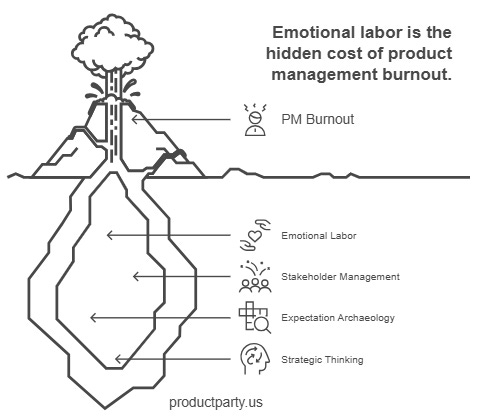Your emotional intelligence is sabotaging your career.
How to use emotional skills strategically without burning yourself out.
I found myself in an odd position a few years back. I was the oldest person on a high-performing but incredibly vocal product team, working under leadership that was, to put it diplomatically, toxic. My teammates were talented but young, and they had strong opinions about everything.
Without really choosing it, I became the team dad.
Not the fun kind who brings donuts and remembers birthdays. The kind who spends half his day teaching newer employees how to navigate weird office dynamics, explaining why some battles aren't worth fighting, and helping people understand that conflict doesn't always pay off in the long run.
I was doing what I now call "expectation archaeology" - digging into what stakeholders really wanted beneath their initial requests, then managing the emotional fallout when reality didn't match their timelines.
Here's what I didn't realize: I was slowly burning myself out doing everyone else's emotional homework.

The hidden cost of being emotionally generous.
Over 80% of product managers report experiencing burnout during their careers, and it's often connected to something researchers call emotional labor. As a PM, you become the emotional infrastructure that keeps cross-functional teams functioning.
You're managing the reality that engineering wants certainty, design wants creative freedom, sales wants everything yesterday, and leadership wants magic.
In my team dad role, I was absorbing all of this intensity, frustration, and anxiety. I thought I was being a good colleague. I was actually sabotaging my own sustainability.
You're teaching people to read the room constantly, absorbing stakeholder intensity instead of redirecting it, and doing expectation archaeology on repeat. This work feels like leadership, but it's actually overhead that prevents you from doing the strategic thinking that advances your career.

A boundary that changed everything.
I developed what I call the "strategic pause" response. Instead of immediately evaluating whether we could build something, I started asking whether we should build it.
"I like the idea, but let's vet it properly and understand the problem we're trying to solve before we jump into building."
This single shift transformed how I handled emotional labor. Instead of absorbing pressure to move fast, I redirected it toward better problem definition. Instead of doing expectation archaeology for everyone, I taught stakeholders to articulate their actual needs upfront.
The key was framing boundary-setting as better product development, not resistance to stakeholder needs.
What made this sustainable was creating visibility into what was actually happening. I started using Monday.com to track not just what we were building, but what was being requested and why.
When stakeholders could see the current workload visually, those "should we build this" conversations became much easier to have. The strategic pause worked because people could finally see what saying yes actually meant.
You can check out Monday.com here if you want to try this approach.
Using emotional intelligence strategically.
Your emotional skills aren't the problem - using them without boundaries is. Here's how to redirect instead of absorb:
When someone brings you emotional intensity, develop scripts that redirect their energy toward productive problem-solving: "Help me understand what success looks like" or "Walk me through your thinking on the business impact."
Schedule relationship maintenance. Block specific time for expectation setting and conflict resolution rather than treating stakeholder management as constant background noise.
Build team emotional intelligence. Train your team in basic conflict resolution so you're not the single point of failure for team harmony.
The most successful PMs I know use their emotional intelligence to build trust and navigate complexity, but they don't sacrifice their own bandwidth to manage everyone else's feelings.
You can be emotionally generous without being emotionally exhausted. Your emotional intelligence is a career asset when you manage it like one - with clear boundaries and strategic allocation.
Until next week,
Want to connect? Send me a message on LinkedIn, Bluesky, Threads, or Instagram.
I'm starting to work with startups in a consulting capacity, helping founders navigate the specific product challenges that generic advice can't touch.
If you're dealing with scattered priorities, unclear customer needs, or reactive product decisions that feel uniquely messy, I'd love to hear about your situation.
Sometimes the most valuable conversation is the one tailored to your exact context, not startup theory in general.





I couldn't agree with you more! This happened to me not too long ago. I think part of it is because management isn't doing their job well, so people seek comfort and help from anyone who's willing to listen to them.
At first, I felt special because, you know? “People trust me and feel heard,” but I was carrying too heavy a burden. So I started filtering out people's deep and personal things. It wasn't healthy for me.
Today, management is still a mess, haha but I'm pushing back on this and analyzing whether there really is a problem and whether it's worth fighting for.
The reality is that many team members who aren't “emotionally” mature enough express anything they consider inappropriate. It's difficult and unfair to absorb all of that. People should calm down first and really think.
Great reflection as always, Mike!
I disagree, I think EQ is power and I wrote about it here